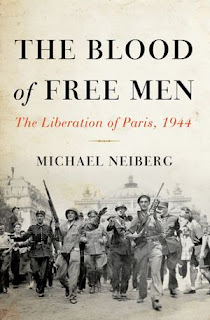 century, including Dance of the Furies: Europe and the Outbreak of World War I.
century, including Dance of the Furies: Europe and the Outbreak of World War I.He applied the “Page 99 Test” to his latest book, The Blood of Free Men: The Liberation of Paris, 1944, and reported the following:
Even while it was happening, the liberation of Paris became one of the few uplifting symbols of a murderous war. Since the end of the war the liberation has grown in its symbolism, although not always in ways consistent with history as it actually happened. The scenes of elation captured by reporters and photographers in those dramatic days of August, 1944 remain some of the most joyous ever recorded. Today the image most Americans have of the liberation is the parade of American soldiers down the Avenue des Champs Élysées. It commemorates America at its finest, using its might and power to free oppressed people in the most beautiful city in the world.Learn more about The Blood of Free Men at the Basic Books website.
Page 99 might therefore surprise some people. It recounts discussions in mid-August between Maj. Gen. Philippe Leclerc, the courageous commander of the French Second Armored Division, and American generals George Patton, Omar Bradley, and Leonard Gerow. The Americans made it clear to Leclerc that the liberation of Paris was not a priority for them. Instead, they wanted to bypass Paris and press on to the Rhine in the hopes of cutting off German forces before they could cross the river.
Leclerc and Free French leader Charles de Gaulle were appalled by this American logic. They knew that Paris was suffering terribly under German occupation and that the Allied landings in Normandy had paradoxically made the situation in the capital much worse by cutting the city off from its main food supplies. They also knew that the French resistance inside Paris was commanded by members of the extreme left whom they (wrongly) suspected of preparing to fight a civil war rather than hand the city over to de Gaulle or the Americans.
For the next ten days Paris sat in a kind of strategic vacuum. The Americans, from Supreme Commander Dwight Eisenhower on down, tried to ignore Paris for as long as they could. Leclerc and de Gaulle, by contrast, began to hoard supplies and quietly move their units in case they decided that they had no choice but to charge into their beleaguered capital. And inside the city, the people of Paris were preparing to liberate themselves – with or without help from the outside world.
The Page 99 Test: Michael S. Neiberg's Dance of the Furies.
--Marshal Zeringue



